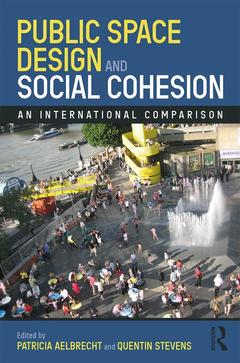Description
Public Space Design and Social Cohesion
An International Comparison
Language: English
Subject for Public Space Design and Social Cohesion:
Keywords
Young Man; performative urbanism; Neighbourhood Commercial Street; urban regeneration; Measure Social Cohesion; placemaking; Fostering Place Attachment; urban planning; Contemporary Public Memorials; architecture small cities; Public Private Partnerships; urban design; Public Space Design; social cohesion; Contemporary Urban Design Practice; legislating; City’s Urban Fabric; zoning; Urban Design Practice; Public space; Commercial Streets; City’s Public Life; Parochial Realm; Urban Public Space; Malviya Nagar; Informal Social; Estate Regeneration; Turkish Amenities; North American Streets; Kennington Lane; Riverfront Park; Steel Steps; Informal Settlements; Multi-use Games Area; Turkish Immigrants
Publication date: 04-2019
· 15.2x22.9 cm · Hardback
Publication date: 02-2019
· 15.2x22.9 cm · Paperback
Description
/li>Contents
/li>Readership
/li>Biography
/li>
Social cohesion is often perceived as being under threat from the increasing cultural and economic differences in contemporary cities and the increasing intensity of urban life. Public space, in its role as the main stage for social interactions between strangers, clearly plays a role in facilitating or limiting opportunities for social cohesion. But what exactly is social cohesion, how is it experienced in the public realm, and what role can the design of city spaces have in supporting or promoting it? There are significant knowledge gaps between the social sciences and design disciplines and between academia and practice, and thus a dispersed knowledge base that currently lacks nuanced insight into how urban design contributes to social integration or segregation.
This book brings together scholarly knowledge at the intersection of public space design and social cohesion. It is based on original scholarly research and a depth of urban design practice, and analyses case studies from a variety of cities and cultures across the Global North and Global South. Its interdisciplinary, cross-cultural analysis will be of interest to academics, students, policymakers and practitioners engaged with a range of subject areas, including urban design, urban planning, architecture, landscape, cultural studies, human geography, social policy, sociology and anthropology. It will also have significant appeal to a wider non-academic readership, given its topical subject matter.
Introduction: From mixing with strangers to collective placemaking: existing theories, policies and practices around social cohesion in public space design Public Space Design, Development and Management Processes Top-down projectsChapter 1. The Making of Democratic Urban Public Space in Denmark Chapter 2. The Marginalised Others: Memorials to non-Jewish Holocaust victims in Berlin’s Government District Chapter 3. Social Cohesion vis-a-vis Spatial Division: The Contradictions of Participatory Design Chapter 4. The Role of Public Spaces on Social Cohesion and Inclusivity: Metamorphosis of a historic park in Ankara, Turkey Chapter 5. A Placemaking Approach to Estate Regeneration Projects: A Practitioner's Perspective Bottom-up projects Chapter 6. Bottom-up Public Space Design and Social Cohesion: The case of a self-developed park in an informal settlement of Bogotá Chapter 7. UN Habitat’s engagement of residents, refugees and local authorities in a public space design process in Bourj Hammoud, Lebanon Chapter 8. Open Green: Placemaking beyond Place-bound Communities in Taipei Post-occupation evaluations Chapter 9. New Public Spaces of Circulation, Consumption and Recreation and their Scope for Informal Social Interaction and Cohesion Chapter 10. Visibility of Turkish Amenities: Immigrant’s Integration and Social Cohesion in Amsterdam Chapter 11. Pop-up Landscape Design and the Disruption of the Ordinary Chapter 12. Designing for Difficulty: Agonistic Urban Design Chapter 13. Exploring Social Equity in the Park: Design and Management of new city-centre spaces in Sheffield, UK, and Ahmedabad, India Chapter 14. The Streets: a Fluid Place of Social Cohesion Conclusion: Emerging Knowledge at the Intersection of Public Space Design and Social Cohesion
Patricia Aelbrecht is Lecturer in Urban Design at the School of Geography and Planning, Cardiff University, UK. Her research focuses on the social dimension of urban design, in particular on how social practices and activism in public space shape and redefine the meanings and uses of public spaces in a wide range of cultural and social contexts in Europe. Recent work also investigates mega-events as catalysts of urban regeneration and the contested regeneration of post-war modernist cityscapes. She holds a PhD in Urban Studies and an MSc in International Planning from University College London, and a BArch and MArch from the Technical University of Lisbon, Portugal.
Quentin Stevens is Associate Professor in the School of Architecture and Design at RMIT University in Melbourne, Australia. He is author of The Ludic City, joint editor of Loose Space: Possibility and Diversity in Urban Life (both Routledge 2007), and author or editor of four other books with Routledge. His research focuses on environment-behaviour relations in public spaces; his recent projects have investigated social engagement around public memorials, public artworks, and urban waterfronts. He holds a PhD in Urban Design and a BArch from the University of Melbourne, and a Master’s in Urban Planning and Policy from the University of Illinois at Chicago, USA.



